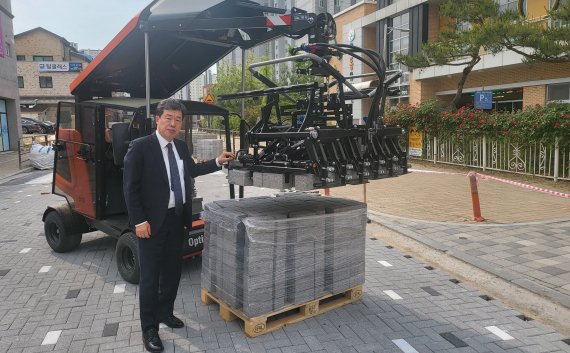Copyright 2023 All rights reserved.
Press release
"The water permeable block absorbs rainwater and returns it to the ground..."Net function on climate change" [Meet CEO of Local Focus Small and Medium Business]
A company specializing in road pavement materials
Baek Won-ok, CEO of Daeil Tech
Eco-friendly Block to Prevent Groundwater Depletion
Due to the nature of the material, it is difficult to increase the strength
Development of Products in Cooperation with Construction Technology
Seoul Gets 1st Grade for Continuity Verification
8th year as a permanent director of the Block Association
Generously share new technologies with member companies

Baek Won-ok, CEO of Daeil Tech, checks the construction status of the block and the automatic packaging machine of the block on the road in front of Okdong Elementary School in Deoksan-myeon, Jincheon-gun, Chungcheongbuk-do, on the 18th.
【 Jincheon = Reporter Kim Won-joon] "The last road pavement method of mankind will be the pavement of the pitcher block."
Baek Won-ok, CEO of Daeil Tech Co., Ltd., a company specializing in manufacturing and installing water permeable blocks. He is confident that the pitcher block will act as a net function on the global environment and have a positive effect on climate change. His logic is that climate change that has hit the world is eventually a problem with water circulation and is occurring as rainwater fails to penetrate into the ground.
Representative Baek said, "Asphalt and concrete pavement, which is common worldwide, cannot flow rainwater into the ground, causing environmental problems such as depletion of underground water in the city," adding, "The depletion of underground water in the city eventually leads to rising sea levels."
■ Water permeation block, rainwater, and return to the ground
Pitcher blocks, also called "hole blocks," literally refer to special sidewalk and road blocks that penetrate water. When it rains, the block absorbs rainwater like a sponge and sends it down to the ground. Unlike asphalt and cement floors that fail to pass rainwater and flow into rivers through rainwater pipelines, the permeable block serves to penetrate rainwater and return it to the ground. This is the most important reason why pitcher blocks are evaluated as eco-friendly products.
As it permeates rainwater into the ground, it has a net function of easing heat island phenomena and promoting groundwater levels along with urban flood prevention functions. As there is no water accumulation on the surface of the block, pedestrians can walk on the street even on rainy days, and worry about car driving noise and rainstorms can be reduced.
■ Key technology to increase permeability and strength
CEO Baek, who had been producing and selling only building materials for many years, became interested in pitcher blocks in 2008. When I heard that the pitcher block I encountered by chance was an eco-friendly product that absorbs rainwater, I thought, "I can succeed with this product." At that time, domestic pitcher blocks were not able to meet the needs of the market due to their low strength. Due to the nature of the water permeable block, the biggest difficulty in the process was that it was difficult to satisfy the strength due to the low density between aggregate particles, the main material. Even now, the industry considers technology that increases the strength of products as a key know-how in the production process of pitcher blocks.
CEO Baek, who was a complete "newbie" in the block field, decided that if he could satisfy only the permeability and strength of the block, he would have a chance to win, and started developing products that could satisfy it. Baek, who was immersed in research and development, succeeded in producing satisfactory quality products through technical cooperation with the Korea Institute of Construction Technology.
However, there was no production facility to mass-produce the pitcher block developed in this way. In 2010, he moved his headquarters in Ansan, Gyeonggi-do to Jincheon, Chungcheongbuk-do, and established a production line for pitcher blocks and began full-scale production. Currently, a second plant is also in operation in Eumseong Saenggeuk Industrial Complex.
■ World's Strongest Pitcher Block Completed
CEO Baek explains that pitcher blocks produced by Daeil Tech are the most intense among domestic and foreign products. CEO Baek said, "Daeil Tech's pitching block for foot and car received the first grade in the Seoul Metropolitan Government's continuity test," adding, "There is a strength reinforcement layer at the bottom of the block, so it is strong enough to be installed in the roadway."
The reason why Daeil Tech's products are so strong is that it uses a one-touch production method that integrates three layers into one. In order to overcome the shortcomings of concrete with weak tensile strength, a super concrete layer 2.5 times stronger than ordinary concrete was created on the bottom layer of a three-layer block. The super concrete layer maximizes tensile strength by using special materials that strongly adhere cement and aggregates. This special substance is a patent-registered ingredient developed by Daeil Tech after receiving technology transfer from the Construction Technology Research Institute, and has completely solved the problem of pushing, peeling, and breaking blocks. Daeil Tech products were designated as excellent procurement products by the Public Procurement Service following the Korea Standards Association's certification of Korea Industrial Standards (KS), the Korea Construction Life Institute's Q mark, and the Korea Environmental Industry Research Institute's certification. Recently, it received NEP certification from the Ministry of Trade, Industry and Energy for the first time as a pitcher block product.
Daeil Tech has built pitching blocks on numerous major cars and sidewalks across the country. A typical construction site is a four-lane road in front of Jochiwon Station in Sejong City. Daeil Tech installed a pitcher block in November 2017 on the road, which is 390m long and has a speed limit of 60km per hour. CEO Baek said, "It is the first time in the world that a pitcher block has been built on a road where buses travel," adding, "As asphalt has been removed and a pitcher block has been constructed, nearby merchants are satisfied."
■ Sharing technology and spreading awareness through the association
CEO Baek has been a permanent director of the Korea Block Association since 2015. He is making efforts to spread awareness of pitcher blocks and share technology in the association. If any of the member companies wish to produce pitcher blocks, they will generously pass on their know-how. There are a total of three companies that produce pitcher blocks by receiving the technology of Daeil Tech. Four to five places are preparing production facilities.
Baek is also a celebrity in the international block industry.
He will participate in international events such as international seminars on urban eco-friendly rainwater management as well as overseas technology presentations. At the International Conference on Concrete Block (ICCBP) held in Seoul in 2018, he also published a paper on pitcher blocks.
"We are trying to find and solve the carbon neutrality problem, a global climate change issue, in the block," CEO Baek said. "We are currently preparing to produce prototypes that minimize the use of cement, and through this, we will create a new paradigm for urban packaging."
kwj5797@fnnews.com Reporter Kim Won-joon
Source: Financial News (https://www.fnnews.com/)
